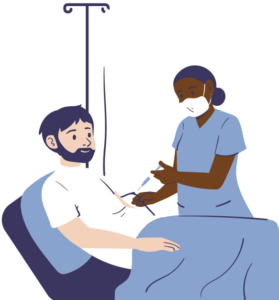
Newer biological treatments do not have a greater infection risk than traditional immunosuppressants
 April 08th, 2024
April 08th, 2024 Nakita Cambow
Nakita Cambow Latest News
Latest News 0 Comments
0 Comments
A new study has found that people with lupus who are taking newer biological therapies and the same level of risk for serious infections as those taking standard immunosuppressants. Having higher doses of steroids such as prednisolone increased the risk of serious infections.
Background
Lupus is an autoimmune disease where the immune system is dysfunctional and mistakenly attacks the body’s own tissues. Treatments for lupus work by reducing the immune response. However, both lupus itself and the treatments for lupus can increase the risk of infections. Serious infections can cause hospital admissions, further damage to the body, and occasionally death. This means it’s important to find out how much different treatments may increase the risk
Some people are able to manage their lupus with hydroxychloroquine. Those with more severe symptoms, or during a flare, may be given steroids such as prednisolone. If steroids are not effective, or for more severe disease, immunosuppressants such as azathioprine and mycophenolate mofetil may be used. Biological therapies such as rituximab and belimumab are usually only given when other treatments have not been effective.
This study aimed to find out if the risk of serious infection was different between the newer biological therapies and the traditional immunosuppressants. They also wanted to find out if there were other risk factors for patients with moderate-to-severe SLE.
What did this study do?
This study was conducted by the British Isles Lupus Assessment Group (BILAG). BILAG have a register of people with lupus in the UK who are receiving biological and standard immunosuppressant treatment.
BILAG looked at 1048 people with lupus on the register to see how many developed serious infections during the year after first starting a new lupus treatment. For this study, “serious infections” meant they were admitted to hospital and needed antibiotics through an IV, or that the infection resulted in further illness or death.
What were the findings?
The key findings were:
- The number of people who developed serious infections within a year of starting treatment was similar for rituximab, belimumab, and standard immunosuppressants (which included mycophenolate mofetil, azathioprine, cyclophosphamide, two tacrolimus, and ciclosporin A).
- Serious infections were more likely with doses of prednisolone higher than 10mg (compared to less than 10mg).
- Having more than one lupus medication (combination therapy) did not increase the risk of serious infections.
- People with low antibody levels (called “hypogammaglobulinaemia”), or multiple long-term conditions (like diabetes or high blood pressure), were more likely to develop a serious infection.
The findings suggest that newer biological treatments do not increase the risk of serious infections when compared to standard immunosuppressant treatments. Having multiple long-term conditions, especially diabetes and high blood pressure, increased the risk of serious infections, no matter what treatment the person was taking.
The findings also suggested that people taking higher doses of prednisolone were at greater risk of serious infections than those on lower doses. The study researchers suggested that steroids should be used less to treat lupus, and other treatments such as standard immunosuppressants and biological therapies should be prioritised. They also suggested that people on steroids should have more regular reviews of their dose.
What do LUPUS UK think?
“It is brilliant to have these findings from such an important study examining the effect of various lupus treatments in a real-world setting. Starting a new medicine for a chronic disease can be worrying, so I hope it will reassure people with lupus to learn that their risk of serious infection is not increased by newer treatments such as rituximab and belimumab. However, these findings also highlight the significant need for the development and use of more new treatments to manage lupus symptoms safely and effectively. The treatment of lupus remains over-reliant on steroids, such as prednisolone, leaving patients exposed to a greater risk of serious infections.” – Paul Howard (LUPUS UK Chief Executive)
Read full research article here: https://www.thelancet.com/journals/lanrhe/article/PIIS2665-9913(23)00091-7/fulltext





 ©2024 LUPUS UK (Registered charity no. 1200671)
©2024 LUPUS UK (Registered charity no. 1200671)